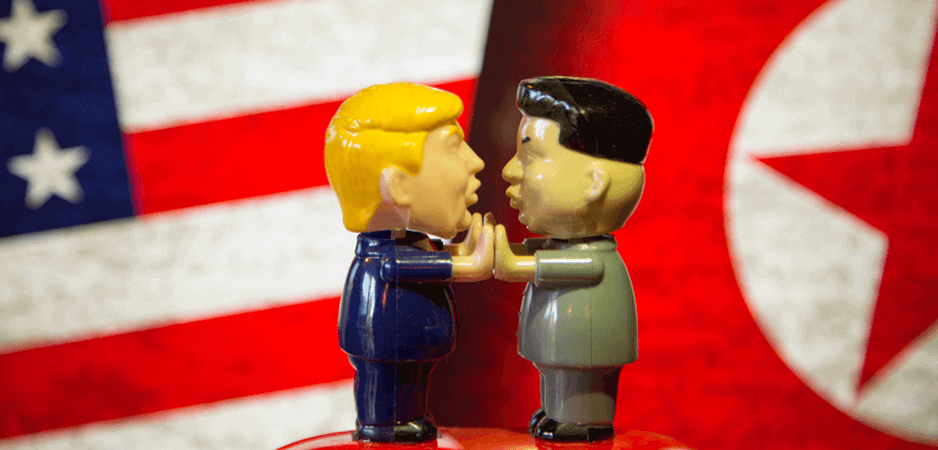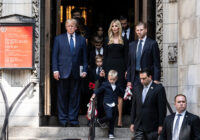Donald Trump has discovered love at second sight. The Daily Devil’s Dictionary gives its take.
It has taken some time, but US President Donald Trump — the tough real estate dealmaker, strong-arm president, serial liar, pussy grabber and unhinged cavorter with porn stars — has revealed that, when it comes to international politics, he is a romantic at heart, capable of expressing sentiments that are truly and deeply sincere.
AFP recounts Trump’s latest confession, this one concerning his feelings for a man whom he spent a good part of 2017 showering with insults: North Korean leader Kim Jong-un. In a moment of improvisation during a speech at a West Virginia rally for Republican candidates, Trump let his emotions spill out for the whole world to see: “And then we fell in love — OK? No really. He wrote me beautiful letters and they’re great letters. We fell in love.”
Here is today’s 3D definition:
In love:
A state of emotional excitation directed toward another person, in the knowledge or hope that that person will evince reciprocal feelings. For narcissists, a state of emotional excitation directed toward oneself provoked by any occasion in which another person’s behavior provides new evidence of the immense importance of loving and admiring oneself.
Contextual note
The last week of September began with the historic moment when Trump — after a possibly intentional late arrival designed to show his disdain for the institution — got the United Nations General Assembly to laugh in disbelief at the stratospheric levels the US president’s narcissism could attain. The week ended with Trump’s stirring confession of his passionate, undying love, not for Kim Jong-un as he proclaims, but for the North Korean leader’s choice of Trump as the object of his epistolary admiration.
There may be a link between the two events, attributable to Trump’s belated understanding that the laughter of the General Assembly was anything but an expression of love for the visionary leader who had already made America great again. To compensate for his chagrin, he focused his emotions on the one national leader who understood how important it was to love and admire Trump.
Historical note
According to The Guardian, “Trump grumbled that commentators would cast him as ‘unpresidential’ for describing Kim in such glowing terms.” His intention seems to modify the historically established meaning of the term “presidential.” This became clear when he explained, “It’s so easy to be presidential, but instead of having 10,000 people outside trying to get into this packed arena, we’d have about 200 people standing right there.”
Trump not only believes in his brand; he believes being presidential is an act of branding. The old, historical notion of presidential required discretion, dignity, a façade that announced reflection and mature judgment. That was the old brand, which no longer draws crowds. Trump is the model for the future. Arrogant, impetuous, peremptory, direct to the point of being insulting (even to those whom one ends up being “in love” with), that is the new model. And what counts is not the new leader’s thoughts, but his emotions. Instead of building an “effective wall” on the border, the leader must have a “big, beautiful wall.” Instead of establishing a strong mutual relationship, the leader seeks to “fall in love.”
Trump is clearly an innovator. But his position contains a very Republican logic that may explain how he has reached such a level of hyperreality. Ronald Reagan was the first president who was, throughout his tenure, more a brand than a president. A pure product of Hollywood, with years of experience in advertising, he knew how to play the role and do the promotion. The Republicans had the template for future success. But neither of the Bushes were credible as brands, and though George W. Bush was re-elected, Reagan remained their eternal model for the ideal of a presidential president.
But even Reagan didn’t innovate. Joe Kennedy, John F. Kennedy’s father, a former Hollywood mogul who drifted into politics and wished to become president himself, built his son into a brand and managed to get him elected. Unlike Reagan, JFK had a mind, a will and a sense of the world that kept him in contact with reality. Perhaps even too much so. The powers who were happy enough to have him preside as a brand may have become impatient with his refusal to distance himself from reality. Many suspect reasonably that they took the initiative to make the distance between Kennedy and reality definitive one day in November 1963.
The real question no one dares to ask is whether Trump hasn’t actually changed the perception of what it is to be “presidential.” What will the old “normal” look like the day he leaves the White House, voluntarily or involuntarily? Will it be credible or even attractive to the electorate? Will people accept and support a reflective, self-effacing, discrete, serious manager of a collapsing empire that formerly — before Trump — exercised the privilege of quietly dictating the rules the world lived by? Or will they hanker, amidst the chaos, for another boastful narcissist who promises to exploit the vanishing power that they nostalgically wish to see restored?
*[In the age of Oscar Wilde and Mark Twain, another American wit, the journalist Ambrose Bierce, produced a series of satirical definitions of commonly used terms, throwing light on their hidden meanings in real discourse. Bierce eventually collected and published them as a book, The Devil’s Dictionary, in 1911. We have shamelessly appropriated his title in the interest of continuing his wholesome pedagogical effort to enlighten generations of readers of the news.]
The views expressed in this article are the author’s own and do not necessarily reflect Fair Observer’s editorial policy.
Support Fair Observer
We rely on your support for our independence, diversity and quality.
For more than 10 years, Fair Observer has been free, fair and independent. No billionaire owns us, no advertisers control us. We are a reader-supported nonprofit. Unlike many other publications, we keep our content free for readers regardless of where they live or whether they can afford to pay. We have no paywalls and no ads.
In the post-truth era of fake news, echo chambers and filter bubbles, we publish a plurality of perspectives from around the world. Anyone can publish with us, but everyone goes through a rigorous editorial process. So, you get fact-checked, well-reasoned content instead of noise.
We publish 2,500+ voices from 90+ countries. We also conduct education and training programs
on subjects ranging from digital media and journalism to writing and critical thinking. This
doesn’t come cheap. Servers, editors, trainers and web developers cost
money.
Please consider supporting us on a regular basis as a recurring donor or a
sustaining member.
Will you support FO’s journalism?
We rely on your support for our independence, diversity and quality.






